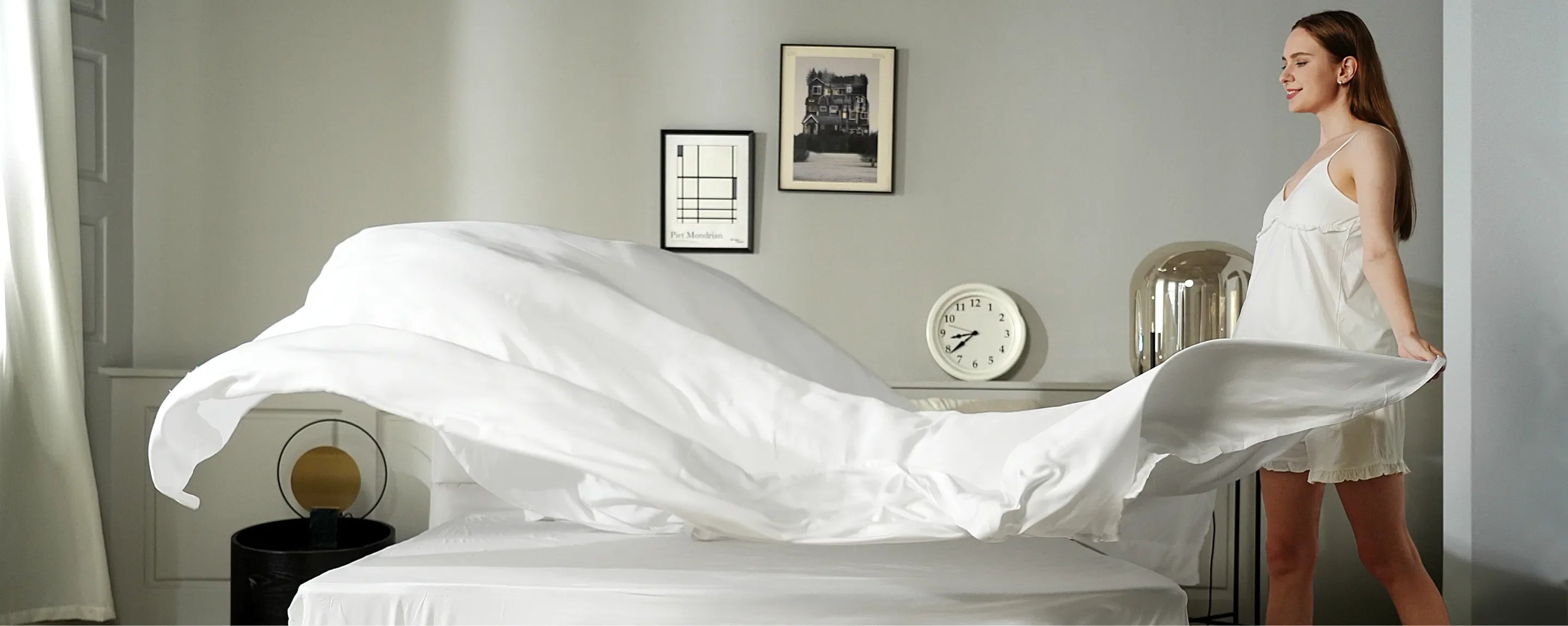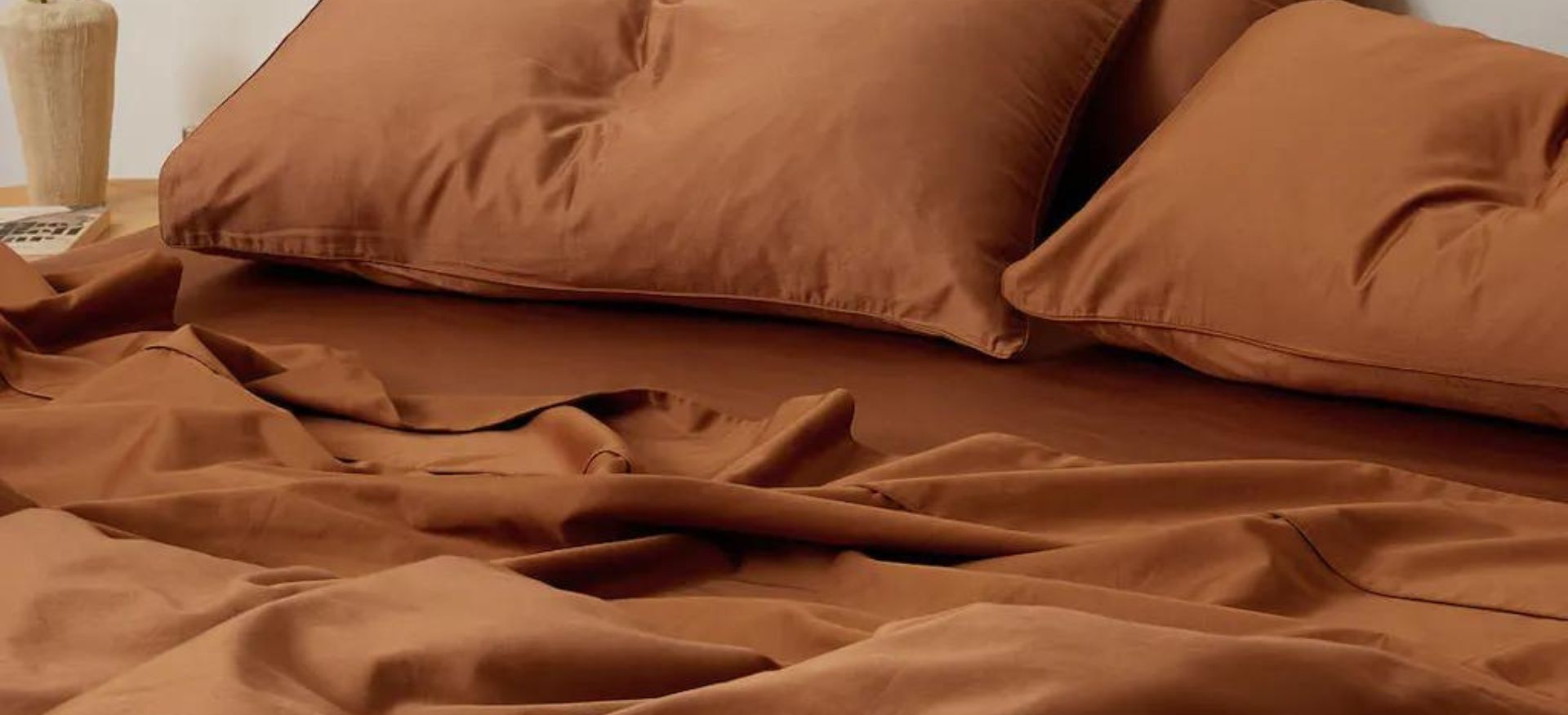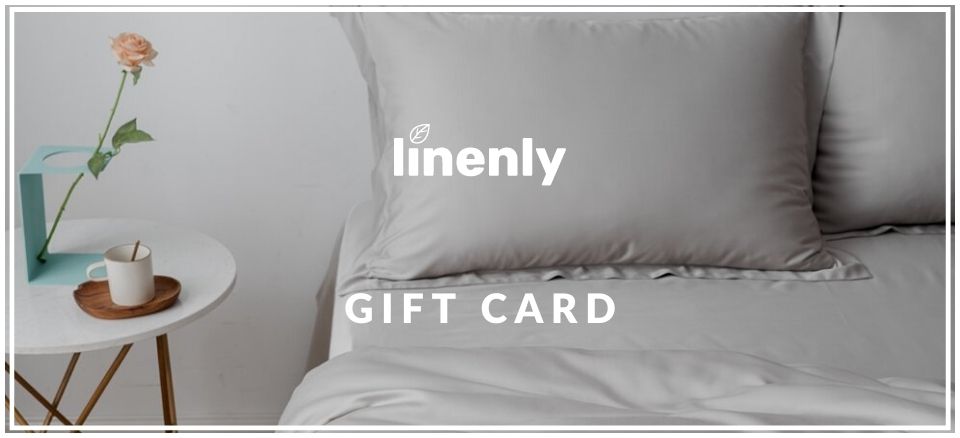Frequently Asked Questions
We are proud to say that all of our products are made from 100% organic bamboo fibre which is produced without any toxins or harmful substances. All of our bamboo sheets boast an Oeko-Tex certification, which ensures they are manufactured in accordance with organic guidelines and standards. You can see the certifications of our bamboo fabric here.
Yes! Our bamboo sheets are STANDARD 100 BY OEKO-TEX® BJ025 164353 Hohenstein TESTEX. OEKO-TEX is a worldwide independent testing and certification system for textile products, focusing on limiting the use of harmful chemicals during the manufacturing process.
Our organic bamboo fabric is hypoallergenic, breathable, naturally antibacterial and free from harmful chemicals, making them suitable for people with sensitive skin or allergies, or your little ones.
There is a general misconception that the higher the thread count, the better the linen. However, the thread count does not guarantee the linen’s quality. If your linen is made from short, stubbly and rough threads, this term will be meaningless and is unlikely to be a luxurious sleeping experience. It is also impractical to compare different material types in this way, as the raw materials and manufacturing processes are not the same.Linen quality is better measured by considering the materials, weaving methods, dyeing processes and workmanship involved.
We are proud to say that all our bamboo sheets have a rich 400 thread count and have been made with a premium sateen weave and industry-leading dyeing process. The thread count and ethical production processes for our linen are currently the best available, ensuring that our customers can enjoy the finest quality bamboo sheets available in Australia.
Along as you follow the laundry care instructions as outlined here on the website and on the packaging of your new sheets, there should be minimal shrinkage as they have been pre-washed and pre-shrunk.
With proper use and care, your bamboo sheets will give you many great nights of sleep.
Please wash your sheets prior to their first use to ensure their softness and breathability. Machine wash is suitable as long as it’s cold (no more than 30 degrees) and washed separately from other garments.
A liquid detergent is preferred but fabric softener and bleach should never to be used as it may ruin the fabric.
When drying bamboo sheets, it’s best to let them air dry but if you must, a tumble dry on the gentlest setting should be alright.
You can learn more about how to take care of your bamboo sheets here.
It really depends on how the bamboo fabric is spun, the dyeing process and the anti-pilling treatments involved. At linenly, we only work with the manufacturers that have access to top quality materials and market-leading weaving and dyeing technology. Regardless, bamboo fabric is still susceptible to slight pilling especially in response to friction which shouldn’t be viewed as a fault or defect. If pilling occurs it can be reduced and or removed during the washing and drying process (as per the care instructions).
Our bamboo fitted sheets fit mattresses up to 40 cm in depth.
At linenly we are very aware of our environmental impact.
Bamboo is a renewable resource that is both green and sustainable. All our sheets are Oeko-Tex certified which means they are ethically made without the use of toxins or harmful chemicals. Also, there is a minimal consumption of water and energy involved in bamboo production compared to cotton and other traditional linen materials.
Our bamboo sheets are made to be biodegradable in the long run and won’t spend eternity in a landfill.
A vast majority of bamboo sheets available in the market are made from 100% bamboo viscose. It’s because bamboo viscose offers the most benefits. They’re not only soft but also very durable. We make sure that our sheets are made from 100% bamboo viscose using strict effluent treatment protocols.
Another popular material used in bamboo sheets is bamboo lyocell. Sheets made from 100% bamboo lyocell material are highly sustainable. Bamboo lyocell material is produced by dissolving raw bamboo with the use of non-toxic solvent. While durable, these sheets are made from 100% bamboo lyocell are relatively less soft than 100% bamboo viscose sheets.
There is only one other company in Australia using Bamboo Lyocell. These sheets are made from the same factory as ours, so I would very much doubt that the “correct” lyocell procedure has been used when making them. And LYOCELL is known for being susceptible to PILLING. PLUS – it adds around $100 more onto the cost of the sheet.
– The following are some tips to choose the best quality sheets:· Always makes sure to check what type of material the sheets are made of. Choose bamboo viscose sheets over bamboo lyocell sheets for extra softness and durability.· Bamboo sheets blended with cotton material are not recommended as they are not as sustainable as the other types of bamboo fabrics. (You also miss out on the vast benefits of bamboo sheets and their feathery soft feel).· If the softness of the sheets is your main concern, then it is recommended that you go for bamboo sateen. This weave is feathery soft as it has a higher thread count as compared to bamboo twill.
Send us an email at hello@linenly.com.au anytime or chat with our friendly team online from Monday - Friday 9:00 AM - 6:00 PM AEST. You can also submit your query through the help button at the bottom right corner when live support is not available, and we will get back to you as soon as possible.
Not to worry, shoot us an email immediately at hello@linenly.com.au after the order is placed and we will make the correction on our end. These issues if addressed in a timely fashion should not delay delivery.
Nowhere in or on our packaging is there a reference to price or method of payment. On top of that, all of our sheets come pre-bundled in a beautiful drawstring bag that is perfect for gifting! However, please note that a receipt will still be sent to the email address you include in your order.
Please email us at hello@linenly.com.au with your order number and name ASAP and we will be able to help you sort it out.
If you are sent the wrong item, please email us at hello@linenly.com.au as soon as possible and include your order details.
Yes, we do. All orders are shipped through Australian Post eParcel and its efficient delivery network to the address provided.
Your order will be shipped within 1-2 business days depending on the time it is placed. Orders placed before 3:00 PM AEST Monday-Friday will ship on the same day. Orders placed after 3:00 PM AEST Monday-Thursday will ship the following business day. All orders placed on Friday after 3:00 PM AEST, on a public holiday or during a weekend will ship on the next business day. Please note delivery may take longer during sales events.
All orders from linenly.com.au are processed by Australian Post. A tracking code will be provided for you to track the delivery status once your order is fulfilled. Please note delivery may take longer during sales events.
Throughout the delivery process, our customers will be emailed in real time with updates on when a package is in transit, when it’s out for delivery and when it’s delivered.
If customers are not home at the time of delivery, the postman will leave a notification in your letterbox and bring your parcel to a nearby post office. Please bring photo ID with you and collect your package as soon as possible as they will only keep it for 3 business days.
If the package is not picked up by the recipient in a timely manner, it may be sent back to us.
When this happens, you the customer will have to wait longer for your luxurious nights sleep, and will be subject to an additional shipping fee. It’s best to keep an eye out for those shipping notification emails in order to ensure a smooth and timely pick up of your linen.
We can only accept returns within 30 days of delivery. We’re confident that you’ll love your bamboo sheets, but if you have received your product and are not happy with it for any reason, we accept returns that are unopened, with their original tags and packaging and in resalable condition. Please be aware that we cannot accept returns for items that have been opened, washed or used due to hygiene reasons.
Any shipping costs incurred for the return or exchange of items that are not faulty are the responsibility of the customer and will not be reimbursed by Linenly.
Our products are of the highest quality, however in the unlikely event that you receive an item that is in a faulty condition or is the wrong size/colour, please contact us immediately at hello@linenly.com.au and send us some photos of your product and the order details. We will do our best to resolve the issue as quickly as possible. If it is faulty (not including the fault exclusions outlined below) we are happy to offer free exchange and will cover the postage costs incurred. Alternatively, we can provide a full refund via the same payment method used for placing your order. Faults must be reported to Linenly within 30 days from the time you receive your order. Please allow 1-2 weeks from the time you return your order for your return to be processed.
Your bamboo sheets are designed for your regular home use and will stay silky soft and smooth with proper care. You can read more about the care of your linen here.
At linenly, we only work with the manufacturers that have access to top quality materials and market-leading weaving and dyeing technology. Regardless, bamboo fabric is still susceptible to slight pilling especially in response to friction which shouldn't be viewed as a fault or defect. This is normal for organic and natural fibres that have not been treated with harmful chemicals. To limit pilling, we recommend washing your linen separately and reducing contact with abrasive surfaces or fabrics (including towels).
In linenly, we really want to make the return process as quick and painless as possible.
We have a 30-day return policy. If you don’t like our products for any reason and would like to return or exchange, please contact us at hello@linenly.com.au as soon as possible from the time of delivery. Your message should state the details of your order including what products were purchased, the order number, customer name and the item on the order you wish to return.
Please provide a brief reason for the return and how you would like to be reimbursed (exchange, refund or store credit).Unfortunately return postage is the responsibility of the customer and will not be covered by Linenly unless the product is faulty. Please don’t ship back an item before emailing in your return request as your return may not be processed.
GET IN TOUCH
Want to get in touch with us? Just fill out the form below and we'll get back to you ASAP.


